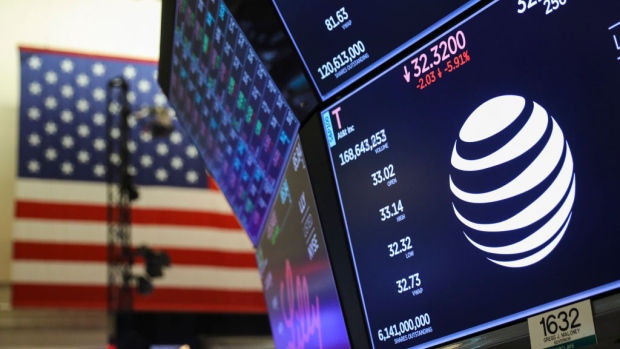Dec 6, 2018
U.S. Can’t Stop AT&T Deal or Balkanization of TV
, Bloomberg News

(Bloomberg Opinion) -- Changes in the TV-entertainment industry’s competitive dynamics are already causing consumer frustration through channel blackouts and general difficulty finding content. The U.S. Department of Justice has fixated on the role played by the gargantuan AT&T Inc.-Time Warner Inc. merger, but its Hail Mary attempt to undo the deal appears doomed to failure.
In June, AT&T won a long-fought trial over the acquisition, a deal valued at $102 billion including debt (lots of it). The Justice Department appealed the decision despite strong urging by the trial judge, U.S. District Judge Richard Leon, not to do so. On Thursday, three appellate court judges heard from lawyers for both sides, and they were clearly skeptical of the government’s argument. They questioned its contention that Leon used “clearly erroneous logic” and “rejected the economics of bargaining.” They didn’t seem convinced.
It’s been said that the Justice Department couldn’t have asked for a better panel, given that the judges are appointees of Presidents Obama, Clinton and Reagan. They didn’t announce timing for their decision, but I imagine AT&T’s team is already handing out high-fives.
What’s interesting is that while lawyers argued in the abstract about the future, harm is already being done to pay-TV customers. The question is no longer whether that’s happening but who’s causing it. AT&T is playing a role, for sure, but it’s not alone.
The HBO network, one of the assets AT&T inherited in the deal, went dark for subscribers of Dish Network Corp.’s satellite and Sling TV services last month. Dish contends that AT&T wanted it to pay for a minimum number of HBO subscribers upfront even if those subscribers never materialized and, without going into specifics, that the demands were a departure from past contracts with HBO before AT&T came into the picture. But given Dish’s opposition to the Time Warner deal and Chairman Charlie Ergen’s reputation as an industry gadfly, some may view the HBO impasse as a ploy timed to aid the government’s argument about competitive harm. When I asked Ergen about this in an interview on Thursday, he said that the blackout had “zero to do” with the appeal and that there was actually “no PR value” anyway given that the Justice Department couldn’t present new evidence and wasn’t likely to win.
In any case, who stands to win more in an HBO blackout? Probably AT&T, if it makes up for that lost money from Dish through subscriber gains for its own HBO Now app, DirecTV services or the new tiered-package streaming service it’s launching next year, which is expected to be anchored by HBO content.
Still, the situation should be considered in the context of the broader industry. Most top media companies are expected to launch some form of direct-to-consumer services and are therefore beginning to withhold their best content from competitors’ products to put on their own. For example, Walt Disney Co. is pulling its content from Netflix Inc. as it introduces the Disney+ app in 2019. There was also the hoopla this week over “Friends,” for which Netflix paid a whopping $100 million to keep on its service through next year. AT&T owns the rights to the show and can decide whether to share it with Netflix after that point or reserve it for its own products.
What this means for consumers is that it’s not only getting harder to figure out which TV apps and packages carry their favorite shows and movies, but it’s getting expensive to cobble together all the products required to watch them. Blackouts like HBO/Dish are attention-grabbing, but they’re only one symptom of the new media landscape. Netflix has altered consumers’ expectations about the price of pay-TV services and commercial viewing. The only way for the media giants — which have traditionally relied on hefty revenue streams from advertising and cable fees — can to try to match what Netflix offers and still realize the profits they’ve long enjoyed is to introduce their own apps with their own content and begin to cut off rivals’ supply.
AT&T’s Time Warner merger is contributing to this broader trend, and it seems there’s no stopping it now.
To contact the author of this story: Tara Lachapelle at tlachapelle@bloomberg.net
To contact the editor responsible for this story: Daniel Niemi at dniemi1@bloomberg.net
This column does not necessarily reflect the opinion of the editorial board or Bloomberg LP and its owners.
Tara Lachapelle is a Bloomberg Opinion columnist covering deals, Berkshire Hathaway Inc., media and telecommunications. She previously wrote an M&A column for Bloomberg News.
©2018 Bloomberg L.P.